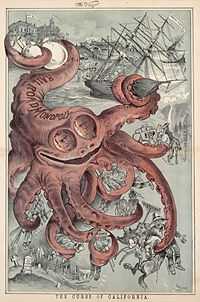Insider trading
An individual who has privileged knowledge of the sales of a publicly traded company is an insider. Usually, these are the top five or six executives of a company. Often, these same individuals have majority ownership of the company. When they buy or sell some of their shares into a depressed or inflated market so as to increase their share of ownership or increase their personal income, they are engaging in insider trading. Such insider trading harms other investors and is usually considered illegal insider trading.
Theoretical insider trading
Def. buying "or selling securities of a publicly held company by a person who has privileged access to information concerning the company's financial condition or plans"[1] is called insider trading.
Monopolistic practices

This two-page illustration portrays the powerful railroad monopoly as an octopus, with its many tentacles controlling such financial interests as the elite of Nob Hill, farmers, lumber interests, shipping, fruit growers, stage lines, mining, and the wine industry. Credit: G. Frederick Keller.
Monopolistic practices are actions that reduce the fair market competition between enterprises or entrepreneurs.
Original research
Hypothesis:
- Insider trading by the top five or six chief executives who own a publicly-traded company should only be allowed with the company itself.
See also
References
Further reading
External links
| Anthropology resources |
|---|
| | Activities | | | | Articles | | | | Categories |
Agriculture ·
Anthropology ·
Archaeology ·
Art ·
Arts ·
Biological Anthropology ·
Culture ·
Dominant group ·
Education ·
Evolutionary anthropology ·
Evolutionary psychology ·
Genetics ·
History ·
Humanities ·
Language ·
Linguistics ·
Literature ·
Medicine ·
Mythology ·
Philosophy ·
Psychology ·
Religious studies ·
Semantics ·
Social anthropology ·
Social psychology
| | | Courses | | | | Fields | | | | Glossaries | | | | Lectures | | | | Lessons | | | | Lists |
| | | Original research | | | | Portals |
History ·
Social sciences
| | | Problem sets | | | | Projects | | | | Proposals | | | | Quizzes | | | | Schools |
Agriculture ·
Alternative medicine ·
Anthropology ·
Archeology ·
Classics ·
Dentistry ·
Gastronomy ·
History ·
Life ·
Medicine ·
Pharmacy ·
Veterinary medicine
| | | Topics | |
|
| Dominant group |
|---|
| | Activities | | | | Courses | | | | Definitions & Meaning | | | | Diffusion |
Aristocracies ·
Authors ·
Empires ·
Hierarchies ·
Killers ·
Journals ·
Languages ·
Slavery ·
Wealth
| | | Fields | | | | Income opportunities | | | | Lectures | | | | Lessons | | | | NEH proposal sections | | | | NSF proposal sections | | | | Quizzes | | | | Resources | |
|
| Economics resources |
|---|
| | Activities |
| | | Articles | | | | Categories |
Category:Business ·
Category:Economics ·
Category:Entrepreneurial economics ·
Category:Environmental economics ·
Category:Mathematical economics ·
Category:Measuring the mindedness of the electorate in 2008
| | | Courses | | | | Fields | | | | Glossaries |
| | | History |
| | | Hourlies |
| | | Laboratories |
| | | Lectures | | | | Lessons |
| | | Lists |
| | | Major examinations |
| | | Original research |
| | | Portals |
| | | Problem sets |
| | | Projects |
| | | Quizzes | | | | Schools | | | | Topics |
Topic:Basics of Economics ·
Topic:Behavioral economics ·
Topic:Democratizing innovation ·
Topic:Ecological Economics ·
Topic:Economic research ·
Topic:Economics text development ·
Topic:Environmental economics ·
Topic:Free Market Economics ·
Topic:Institutional economics ·
Topic:Labour economics ·
Topic:Managerial economics ·
Topic:Mathematical economics ·
Topic:Microeconomics ·
Topic:Political economy ·
Topic:Positive economics ·
Topic:Socioeconomics
|
|
| Humanities resources |
|---|
| | Activities | | | | Articles | | | | Categories |
Agriculture ·
Anthropology ·
Archaeology ·
Art ·
Arts ·
Culture ·
Dominant group ·
Education ·
Genetics ·
History ·
Humanities ·
Language ·
Linguistics ·
Literature ·
Medicine ·
Philosophy ·
Psychology ·
Religious studies ·
Semantics ·
Social psychology
| | | Courses | | | | Fields | | | | Glossaries | | | | Lectures | | | | Lessons |
| | | Lists |
| | | Original research | | | | Portals |
History ·
Social sciences
| | | Problem sets | | | | Projects | | | | Proposals | | | | Quizzes | | | | Schools |
Agriculture ·
Alternative medicine ·
Anthropology ·
Archeology ·
Classics ·
Dentistry ·
Gastronomy ·
History ·
Life ·
Medicine ·
Pharmacy ·
Veterinary medicine
| | | Topics | |
|
| Income |
|---|
| | Activities |
| | | Articles | | | | Courses | | | | Fields | | | | Lectures | | | | Lessons | | | | Lists | | | | Problem sets |
| | | Projects | | | | Proposals | | | | Quizzes | | | | Schools |
Business ·
Economics ·
Language and literature ·
Law ·
Linguistics ·
Media Studies
| | | Topics |
Behavioral economics ·
Computer programming ·
Ecological economics ·
Economic research ·
Economics text development ·
Foreign Language Learning ·
Free Market Economics ·
Institutional economics ·
Labour economics ·
Political economy ·
Positive economics
|
|
 This is a research project at http://en.wikiversity.org
This is a research project at http://en.wikiversity.org
 |
Development status: this resource is experimental in nature. |
 |
Educational level: this is a research resource. |
 |
Resource type: this resource is an article. |
 |
Resource type: this resource contains a lecture or lecture notes. |
 |
Subject classification: this is an economics resource. |
.jpg) |
Subject classification: this is a humanities resource. |
 |
Subject classification: this is a law resource . |
 |
Subject classification: this is a psychology resource . |

![]() This is a research project at http://en.wikiversity.org
This is a research project at http://en.wikiversity.org